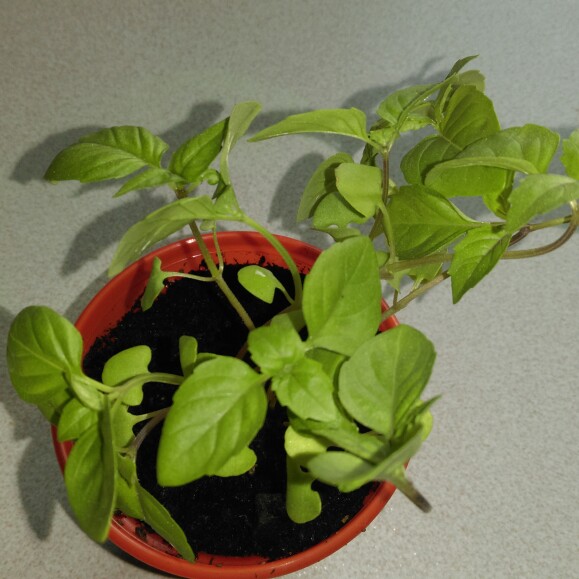
Ocimum basilicum 'Cinnamon'
Basil 'Cinnamon'
Ocimum is a group of aromatic plants found in the Mint family, Lamiaceae. Many of the species are found in tropical and warm temperate climates. Specifically, Ocimum basilicum - commonly known as Basil - is native to tropical & subtropical Asia to North Australia. It is a culinary herb which is technically a short lived sub-shrub but it is often grown in cooler climates as an annual plant. The plant is very tender. The species has bright green edible, rounded to oval leaves, and plants produce white flower spikes in Summer. A number of cultivated varieties are now available. 'Cinnamon' - also known as Mexican Spice Basil - has a spicy taste. It has narrow, slightly serrated, dark green, shiny leaves with reddish-purple veins, which can resemble certain types of mint, and produces small, pink flowers.
Contributed by @urbangardengirl
-
Full sun to partial shade
-
Very little water
-
Not Frost hardy
-
Free draining and fertile
Common name
Basil 'Cinnamon'
Latin name
Ocimum basilicum 'Cinnamon'
type
Annual or short-lived perennial
family
Lamiaceae
ph
5.6 - 7.8 Acid - Neutral
Plant & bloom calendar
-
Best time to plant
-
When the plant will bloom
-
When to harvest
full grown dimensions
 0.50 M
0.50 M
0.50 M
0.50 M
Ocimum basilicum 'Cinnamon'
Ocimum is a group of aromatic plants found in the Mint family, Lamiaceae. Many of the species are found in tropical and warm temperate climates. Specifically, Ocimum basilicum - commonly known as Basil - is native to tropical & subtropical Asia to North Australia. It is a culinary herb which is technically a short lived sub-shrub but it is often grown in cooler climates as an annual plant. The plant is very tender. The species has bright green edible, rounded to oval leaves, and plants produce white flower spikes in Summer. A number of cultivated varieties are now available. 'Cinnamon' - also known as Mexican Spice Basil - has a spicy taste. It has narrow, slightly serrated, dark green, shiny leaves with reddish-purple veins, which can resemble certain types of mint, and produces small, pink flowers.
Flowering Season
From Mid Summer TO Late Summer
It is in flower from from mid to late summer, and the seeds ripen in early autumn. The flowers are hermaphrodite (have both male and female organs) and are pollinated by Bees.
Planting young plants
From Mid Spring TO Late Spring
Plant in light (sandy) and medium (loamy) soils and it prefers well-drained soil, in a site where the plants will get at least 6 hours of sun a day.. Suitable pH: acid, neutral and basic (alkaline) soils. It cannot grow in the shade. It prefers moist soil. Water freely during dry periods.
Propagation by Seed
From Late Spring TO Early Summer
Fill a seed tray with seed compost,water and allow to drain. Sprinkle seeds over the surface allowing roughly 25mm space between seeds and cover with a thin layer of compost. Put tray in a clear polythene bag and place on a windowsill. When seedlings show remove plastic bag. When the second pair of leaves appear on the seedlings thin out to 50mm spacing by removing the weakest looking plants. After 2 or 3 weeks and when danger of frost has passed plants can then be planted outside into required position.

















